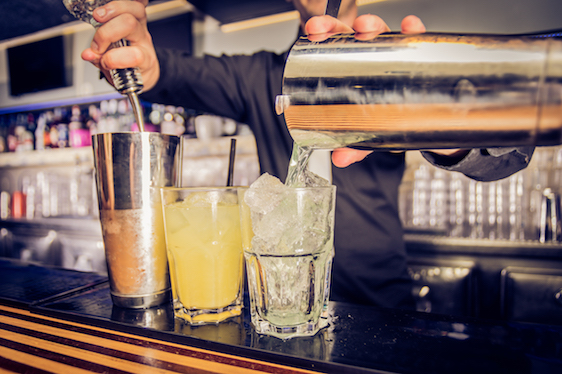Many hotel bars have been selling bottled cocktails and cocktail kits to go as a stop-gap revenue generator during the COVID-19 pandemic, but some experts say bottled cocktails could stick around long after this world health crisis is resolved.
“If there was a way for me, after enjoying a super unique cocktail, to take it home with me so that I could have a glass of it tomorrow night, I would do it in a heartbeat,” says Jacob Musyt, director of food and beverage at the Waldorf Astoria Beverly Hills, which just recently reopened its signature rooftop restaurant, The Rooftop by JG.
Musyt says that during the pandemic, many hotel bars and restaurants have offered meals and beverages to go, including cocktails or cocktail-making kits, and this practice could become a lasting addition.
“This could be potentially a permanent change not just in luxury hotels, but throughout the restaurant business and on the cocktail front,” Musyt says. “I’ve seen customers enjoy a bottle of wine at a restaurant and then buy seven bottles to take home. We could see the same thing happen with cocktails a little further down the line.”

Contributed by Jeanette Hurt
Implementing a prebatched and prebottled cocktail program takes solid planning, says Aubrey Dodd, a mixologist and consultant for bars and restaurants.
The first consideration is legal, Dodd says, pointing out that liquor laws state to state and country by country. “It might be easier for some hotels to do cocktail kits – selling the liquor in separate containers from the mixers – as there aren’t any laws against selling lime juice and simple syrup outside of its original containers,” she says.
“I do see liquor laws adjusting in the future,” Musyt says.
The next consideration is the container for the to-go cocktails. “I’ve seen pouches, I’ve seen jars and I’ve seen bottles,” Dodd says.
The containers could become branding opportunities for hotels and for bartenders. “The bartender who created the cocktail can sign the bottle or add their recipe and name to it,” Musyt says. “It becomes not just an experience for our guests, but it also becomes one for the person curating that experience. ‘This is Joe’s house cocktail that he made for me at the restaurant.’ It’s a way to take that restaurant experience outside of the restaurant doors to share with your friends and family.”
It’s important that the bartending staff understands how to pre-batch and pre-mix cocktails. “Batching is something that sounds easy – just scale up the recipe – but there are a lot of volatile pieces in cocktail recipes, for example, citrus,” Dodd says. “Citrus (acidities) vary widely, and they taste differently when they’re not shaken. You also need to make sure that you’re diluting your cocktail appropriately so that your guest can just open the bottle and pour it over ice.”
Hotel bar managers will want to watch that the batches are consistent. “You need to also make sure that the cocktail is shelf-stable or that it has an expiration date if you’re taking it out of the hotel,” she says. “You have to have a baseline knowledge of how batching will affect a cocktail.”
Dodd says that some hotels she’s worked with have pre-bottled negronis and manhattans simply just to serve them to guests, and it wouldn’t take much more to then have them to sell as to-go cocktails. “It’s really about the (hotel) bar making sure they’re educated enough to present high-quality cocktails that are just as good as they would get at the bar,” she says.
Musyt says this idea is something his own bartending staff would easily get behind such a project. “Our bartenders just returned to the hotel for training and onboarding process,” he says. “If we move in that direction, they would be very excited about it.”
